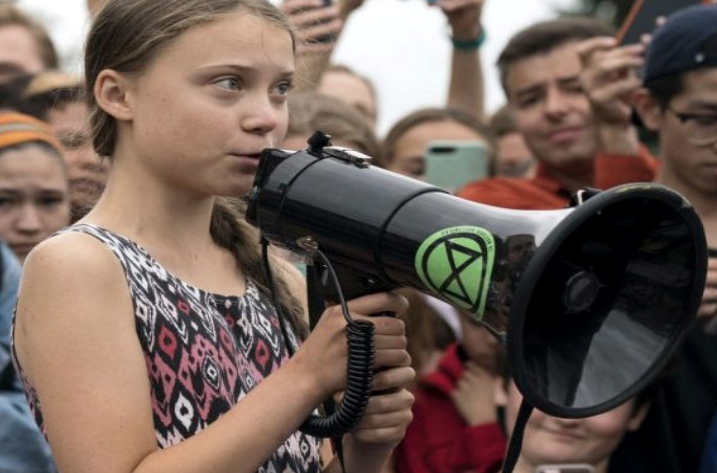CommentsDEEGAN ON LA-“We are never going to get our planet back to the way it was,” exclaimed 16-year-old Claremont high school student Sofia Cervantes, whose role model is 16-year-old Swedish schoolgirl climate activist and Nobel Peace Prize Nominee Greta Thunberg (photo above).
A pair of teenage girls, continents apart, reflect what’s on the minds of many kids today. They may be too young to vote, but they have an issue with climate change, and they are passionate about it. Politicos take note: in a couple of years these young people -- their whole generation -- will be expressing themselves at the ballot box.
Sophia and Greta are not alone. A Washington Post-Kaiser Family Foundation Climate Change Survey conducted this summer revealed that:
- Fifty-seven percent of teens are “afraid” of climate change.
- Roughly a third say the issue is “extremely important” to them personally.
- Fifty-four percent are “motivated” to do something about it.
- Roughly 1 in 4 teens have participated in a walkout, attended a rally or written to a public official to express their views on global warming.
- A solid majority of American teenagers are convinced that humans are changing Earth’s climate and believe that it will cause harm to them personally and to other members of their generation.
- More than 7 in 10 teenagers and young adults say climate change will cause a moderate or great deal of harm to people in their generation.
- Just under half believe the United States must drastically reduce its fossil fuel use in the next few years to avoid the worst effects of climate change.
- Roughly forty percent say mitigating the effects of warming will require major sacrifices from ordinary Americans.
- Eighty-six percent say human activity is the cause of climate change
Greta Thunberg delivered a blunt message to Senators a few days ago, saying: "Please save your praise, we don’t want it. Don’t invite us here to tell us how inspiring we are without doing anything about it. It doesn’t lead to anything," when the climate activist met with U.S. Senators at a Senate Climate Change Task Force hearing on September 17.
Her sentiments, and activism, have sparked a global youth movement drawing attention to what they see -- climate change -- as the priority problem for their generation to deal with, and the need to fight politicians to do something about it.
Feeling that time is running out, and that political leaders are not doing enough to stem the climate crisis, teen groups like Youth Climate Strike, are forming. The YCS Executive Director is 16 years old, its National Creative Director is 17, the National Finance Director is 14, and the National Outreach Director is 16. Their impact today may start to gradually show results and give them the benefit of learning skills needed to be political organizers, as well as give them bonding experience over the next few years. They may create a potent voice as they approach the legal voting age.
In schools, the National Education Association offers a Student’s Guide to Global Climate Change that provides an introduction to climate change issues to public school students.
On a generic political scale, Mayor Gacetti has launched a Green New Deal Los Angeles that includes the goal of a carbon-neutral LA by 2050. . .just when today’s LA teens will be raising their own young families.
More radically, a “to the streets” climate action group Extinction Rebellion LA uses “creative non-violent direct actions to call attention to the Climate Crisis” and supports the Youth Climate Strike LA group and SunriseLA, two local youth climate activist organizations.
A role model for political organization and activism, Barack Obama, met with Greta Thunberg a few days ago and made this statement: "Just 16, @GretaThunberg is already one of our planet's greatest advocates, recognizing that her generation will bear the brunt of climate change, she's unafraid to push for real action."
The Baby Boomer grandparents of today’s teens may be an inspiration to them for what can happen through passion, protests, political organization and highlighting issues that cut across generational lines. In the ‘60s it was the fight for clean water and clean air. The Clean Air Act was made law in 1963, and the Clean Water Act followed in 1972, both as a result of youth-led political activism. The first Earth Day was celebrated on April 22, 1970.
Not too much has changed: today’s teens are also fighting for the environment and their future -- but now with much higher stakes.
(Tim Deegan is a civic activist whose DEEGAN ON LA weekly column about city planning, new urbanism, the environment, and the homeless appear in CityWatch. Tim can be reached at [email protected].) Edited for CityWatch by Linda Abrams.
















